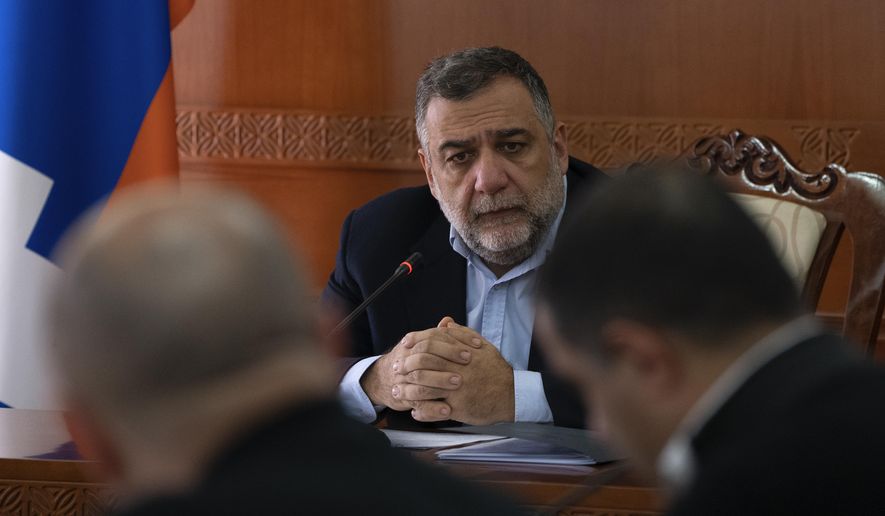OPINION:
Russia’s regime is manipulating the Armenian minority in Azerbaijan’s Karabakh to stir ethnic conflicts in the South Caucasus and to replace the Armenian government with a Moscow proxy. The scenario is reminiscent of other disputes that the Kremlin has manufactured, whether in Georgia, Moldova, or Ukraine, to maintain its sphere of imperial influence.
Washington and U.S. allies, including Turkey, should not be blindsided by this latest move to divide the region but must remain unequivocal over restoring Azerbaijan’s territorial integrity, just as it has in Ukraine.
Russia’s “peace-keeping contingent” was dispatched to Azerbaijan’s liberated territory of Karabakh in the wake of the 2020 war between Armenia and Azerbaijan. Although Baku was able to regain all occupied districts outside Karabakh, a substantial part of Karabakh itself continues to be controlled by Russian troops. Moscow is consolidating its control over Karabakh and plans to use the region as a wedge to dominate Armenia itself.
In November 2022, after consultations in Moscow, Ruben Vardanyan was appointed head of the new administration in Karabakh. Vardanyan is now being prepared by the Kremlin to succeed Armenia’s Prime Minister Nikol Pashinyan, who alienated Moscow by reorienting Yerevan’s foreign policy toward the West. Vardanyan claims to be Armenia’s new national leader and looks set to participate in the next parliamentary elections with full diplomatic, financial, and media support from Russia.
Vardanyan, one of the richest men in Russia, is close to Putin. He served on the country’s presidential “expert councils” and was a co-founder of the Kremlin-directed Primakov Center for Foreign Policy Cooperation. The Center is named after one of the most aggressive anti-Western purveyors of global Soviet power.
He stands accused of laundering money through offshore companies and transferring funds to influential Putin cronies. In March 2022, members of the European Parliament called for an investigation of Vardanyan’s activities as the head of the Troika Dialog investment bank, which became a part of Sberbank in 2011. That same year, the Organized Crime and Corruption Reporting Project (OCCRP) proved conclusively that the Troika Dialog created an extensive network of offshore companies that handled laundered money from Russia. About $4.6 billion passed through 76 companies registered offshore.
In September 2022, Vardanyan surrendered his Russian citizenship in order to avoid Western sanctions, but Ukraine included him in its sanctions list for providing logistical support to Russia’s occupation army. After taking charge in Karabakh, Vardanyan illicitly seized the region’s copper, molybdenum, and gold deposits that belong to Azerbaijan. Protected by the Russian military, the resources were plundered in violation of environmental regulations. Azerbaijani authorities have demanded that experts be granted access to the mines but are repeatedly denied.
Azerbaijani NGOs and environmental activists have responded by staging rallies to prevent the removal of natural resources from the separatist enclave. To discredit these legitimate protests, Vardanyan has tried to manufacture a humanitarian crisis by instigating Armenians to participate in anti-Azerbaijani demonstrations and falsely claiming that the environmental protests were a blockade arranged by Baku to starve Armenians in Karabakh. This blatant disinformation was countered even by Armenian sources showing that food, medicine, and Red Cross humanitarian aid have continued to be delivered with no impediments.
Vardanyan’s strategy is not only to stir inter-ethnic animosities and help regain Russian control over Armenia but also to disrupt energy supplies from the Caspian Basin to Europe. The war in Ukraine has deprived Russia of its status as the key supplier of energy to the EU. In response, the Kremlin seeks to deprive Europe of one of its major alternative sources of gas and oil from Azerbaijan. Azerbaijan currently supplies energy to more than ten EU countries, including Germany, Italy, Netherlands, and Spain. If instability spreads in the region, the risks of sabotage of vital energy infrastructure connecting Europe and the Caspian will escalate.
Vardanyan’s rise to power will also increase Iran’s involvement in the South Caucasus. His links with Iran can be traced through Russia’s Gorchakov Foundation, which organizes events in various countries, including Armenia, with the participation of government-approved speakers from Tehran. These have included Ehsan Movahedyan, an employee of the Tehran Institute of International Relations and the National Security Studies Institute, a structure subordinate to the General Staff of Iran’s Armed Forces. Movahedyan became widely known in Israel for publishing an anti-Semitic caricature of Azerbaijani President Aliyev, who maintains diplomatic ties with Israel. Iran is increasingly hostile toward Azerbaijan and backs Russia’s neo-imperial policy throughout the South Caucasus.
Russia’s power projection into Karabakh and Armenia is deeply destabilizing. It could plunge the wider region into a conflict that embroils Turkey, NATO, Russia, and Iran. To prevent further destabilization, Washington and Brussels must pursue a twin-track strategy aimed at replacing Russian troops in Karabakh with an international peace-keeping contingent and helping to forge a peace settlement between Armenia and Azerbaijan that would bring peace to the South Caucasus while moving both countries closer to the West.
- Janusz Bugajski is a Senior Fellow at the Jamestown Foundation in Washington DC. His latest book is entitled Failed State: A Guide to Russia’s Rupture




Please read our comment policy before commenting.